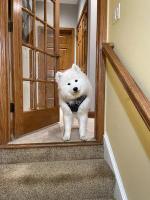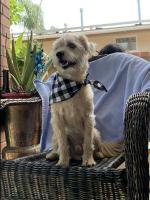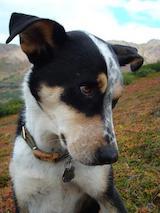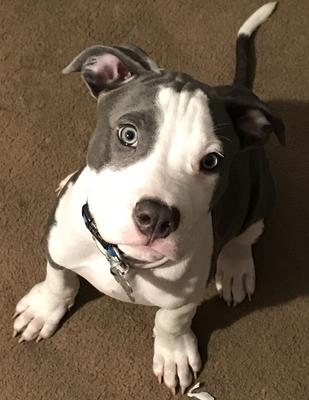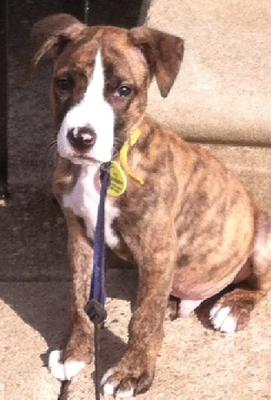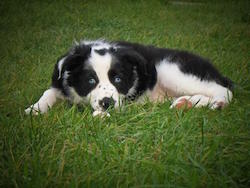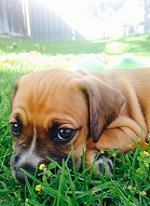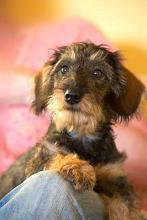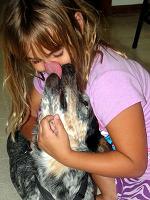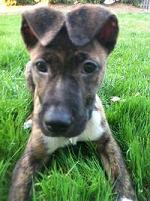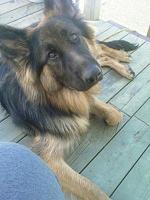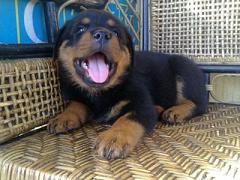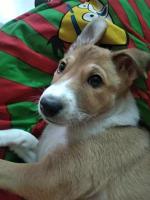Best Dogs With Children - Important Information For Parents
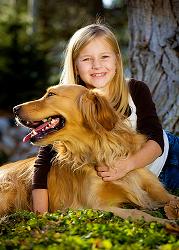
The following will give you a general guideline when determining what the best dogs with children are.
Living with a pet can be beneficial to children. Pets can enhance a child's self-esteem, teach them responsibility and help them to learn empathy. However, dogs with children are not always going to automatically start off with a wonderful relationship. Parents must be willing to teach the dog and the child acceptable limits of behavior in order to make their interactions pleasant and safe.
Selecting The Best Dogs With Children
What age is best? Many people have a "warm fuzzy" image of a puppy and a child growing up together. If you have a young child and are thinking of adopting a puppy (less than one year old) there are a few things you need to consider.
**Time and energy: Puppies require a lot of time, patience, training and supervision . They also require socialization in order to become well-adjusted adult dogs. This means they need to be taken places and exposed to new things and new people. If you have a young child who already requires a lot of care and time, will you have enough time to care for a puppy, as well?
**Safety: Puppies, because they're babies, are somewhat fragile creatures. A puppy may become frightened, or even injured, by a well-meaning, curious child who wants to constantly pick him up, hug him or explore his body by pulling on his tail or ears.
**Rough play: Puppies have sharp teeth and claws with which they may inadvertently injure a small child. Puppies also tend to jump up on small children and knock them down. All interactions between your child and puppy will need to be closely supervised in order to minimize the chances of either being injured.
**Advantages of getting an adult dog: Adult dogs require less time and attention once they've adjusted to your family and household routine, although you'll still need to spend time helping your new dog with the transtion to his new home. You can better gauge how hardy and tolerant an adult dog will be of childish enthusiasm and you can work with your local animal shelter to adopt a dog with a history of getting along well with children. As a general rule, if your child is under six years old, it's best to adopt a dog that's over two years old. Although puppies can be a lot of fun, and it's exciting and rewarding to help them grow into wonderful companions, they do require significantly more time to train and supervise than an adult dog. Adult dogs may be the best dogs with children depending on your lifestyle, but puppies can be the best dogs with children as well.
What are the best dogs with children? Although some general statements can be made about specific dog breeds, the characteristics of an individual dog are just as important as a dog's breed.
**Size: Small breeds of dogs, such as toy or miniature poodles, chihuahuas or cocker spaniels, may not be the best dogs with children. These small breed dogs are more easily injured than larger dogs and may be more easily frightened by a lot of activity, loud noises and by being picked up and fondled frequently. Frightened dogs are not the best dogs with children as they tend to snap or bite in order to protect themselves. Larger dogs may be better able to tolerate the activity, noise and rough play that is an inevitable part of living with children.
**Breed type: Some of the sporting breeds, such as labradors and golden retrievers, are the best dogs with children and make good pets. Breeds that have been selected for protective behavior, such as chows and rottweilers, may not be as good for families with children. It's sometimes difficult for this type of dog to comfortably tolerate the many comings and goings of children and their friends, who may be perceived as territorial intruders. Herding breeds are inclined to "herd" children, chasing and nipping at their heels.
Who Will Care For The Dog?
It's unrealistic to expect a child, regardless of age, to have sole responsibility for caring for a dog. Not only do dogs need basic things like food, water and shelter, they also need to be played with, exercised and trained on a consistent basis. Teaching a dog the rules of the house and helping him become a good companion is too overwhelming a task for a young child. While responsible teenagers may be up to the task, they may not be willing to spend an adequate amount of time with the dog, as their desire to be with their friends usually takes over at this age. If you're adopting a dog "for the kids," you must be prepared and willing to be the dog's primary caretaker.
Starting Off Right
Following are some guidelines to help you start off on the right foot. Remember, small children should never be left alone with a dog or puppy without adult supervision.
Holding:
**It's safest for both your child and puppy if your child is sitting down whenever he wants to hold the puppy. Puppies are squirmy and wiggly and may easily fall out of a young child's arms and be injured. If held insecurely, a puppy may become frightened and snap or scratch in response. After your child is sitting, you can place the puppy in his arms.
**Have your child offer the puppy a chew toy while he pets the puppy. When puppies are teething, they tend to chew on everything, including hands and arms, so having a chew toy handy will divert the puppy's teeth away from your child. An added benefit is that the puppy will come to associate pleasant consequences (getting a treat) with being held by your child.
**For larger dogs, have your child sit in your lap and let the dog approach both of you. This way you can control your child and not allow him to get "carried away" with pats that are too rough. You are also there to teach your new dog to treat your child gently.*
Petting and giving affection: Children often want to hug dogs around the neck. Your dog may view this as a threatening gesture, rather than an affectionate one, and may react with a growl, snap or bite. You should teach your child to pet your dog from underneath the dog's chin, rather than hugging him or reaching over his head. You should also teach your child to avoid staring at, or looking directly into, your dog's eyes.
Giving Treats: Children tend to become somewhat fearful and anxious when a dog tries to take a treat from their hand. This causes them to jerk their hand away at the last second. The dog may then jump up or lunge to get the treat which may result in the child being knocked down. Have your child place the treat in an open palm, rather than holding it in his fingers. You may want to place a hand underneath your child's hand to help guide him.
Supervising Play: Children move with quick, jerky movements, have high-pitched voices and often run, rather than walk. All of these behaviors somewhat resemble the behavior of prey animals. Almost all of a dog's play behaviors are based on predatory behavior. Consequently, even the best dogs may respond to your child's behavior by chasing him, nipping at his heels, jumping up at him or even trying to knock him down.
At first, your child may need to play quietly around your new dog until he becomes more comfortable and calm and your child has gained more control over the dog. Your dog must also learn that certain behaviors on his part are unacceptable, but he must also be taught what behaviors are the right ones. Our handout: "Dealing with Normal Puppy Behavior: Nipping and Rough Play" outlines procedures for discouraging rough play and encouraging appropriate play. However, most children under the age of ten are not capable of carrying out these procedures, so it's helpful to teach your dog a "leave it" command that you can use when play gets too rough. Taking an obedience class together is a good way to teach your dog to respond to commands.
An approach that is not helpful is to punish your dog for his behavior. If he learns that being around children always results in "bad things" happening to him, he may become defensive in their presence.
Possessions: Your dog won't know the difference between his toys and your child's toys until you teach him.
**Your child must take responsibility for keeping his playthings out of your dog's reach.
**If, and only if, you catch your dog chewing on something he shouldn't, interrupt the behavior with a loud noise, then give him an acceptable chew toy and praise him lavishly when he takes the toy in his mouth.
**Don't give your dog objects to play with such as old socks, old shoes or old children's toys that closely resemble items that are off-limits. They can't tell the difference!
**The best dogs can be possessive about their food, toys and space. Although it's normal for a dog to growl or snap to protect these items, it's not acceptable. At the same time, children need to learn to respect their dog as a living creature who is not to be teased or purposefully hurt and who needs time to himself.
Best Dogs With Children Article Source:
Humane Society of the United States
What Is The Best Dog With Children?
Share your opinion with us!
Go from Best Dogs With Children to Aggressive-Dog-Training home page.
We love hearing from our visitors!
Please submit your story, question, photo, or tips. It's a fun, free and easy way to contribute... Receive a response from a real working aggressive dog trainer.
Submit: "My Puppy Is Aggressive"
Submit: "My Dog Is Aggressive"
Recent Submissions

My rottweiler has always loved people. We socialized him since he was born and he's so friendly, but about two months ago... Keep Reading
Hi there, hoping you can advise a little. Our Border Collie is 9 weeks old now. She tends to listen 3/4 of the time when I give her commands and she has playful puppy biting, however ...
Keep Reading
My puppy is a boxer pit bull mix and I know pit bulls have a reputation of being aggressive and... Submitted by Alyssa R. San Diego CA ...
Keep reading
He will really bite if you take something he wants away from like door mats, his bed, or if I tell him off the couch he turns into this horrible animal...
Keep Reading
I can't trust him anymore. We got our dog on the day he was supposed to be put to sleep. Submitted by Laura Dallas Ft. Worth, Texas... Find out why
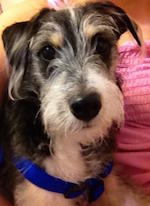
I have a 10 month old fox terrier mix. When he does something bad I point at him and say no. When I do that he attacks my ...
Keep Reading
Puppy Biting Problems
My new pembroke welsh corgi is 2 months old, and already he is biting me pretty hard (not just playful nips), marking all over the house, and trying to hump me when we play together. I'm a little overwhelmed by it, so maybe I should give you a little more detail …
Aggressive Puppy
When we first got our mix puppy he had a slight amount of food agression, but I cured him of that. Well I thought I did. He recently got sick and we had to feed him chicken and rice. This started the agression all over again. This time it was …
Aggressive Schnauzer
I have a 5 year old frenchie
mix and in January rescued
a 4 month old schnauzer mix.
Both are male and nuetered.
For two or three months now,
if my partner …
Deaf Aggressive Bulldog
We adopted an American
Bulldog last December,
and found out a few weeks
later that she is deaf. We
hired a private trainer and
we all learned hand signals …
Stop Dog To Dog Aggression
Charlie is a 6 month old rescue from Puerto Rico.. Recently, he has begun to display aggressive behaviors towards the other two dogs if he has a ...
Keep Reading
Aggressive Dachshund
I have a five year old dachshund
that has always been somewhat
aggressive towards children
and other dogs. We recently
brought home an 8 week golden
retriever …
Aggressive Rescued Dog
Hi, I recently aquired an
abandoned dog. She is a
German Shepherd cross of
medium size. She is an
incredibly loving dog with
me and my boyfriend but has …
Stop Labrador Aggression
We own a 9 month old Golden Lab, she had been re-homed twice before we made her part of our family. We also own a 11 year old Maltese Shitzu, who at first was territorial towards ...
Find Your Breed On Our Website
Aggressive Pit Bull Mix
About 8 months ago I rescued
a pit bull/greyhound mix (Bailey)
from our local shelter. Not much
was known about her history prior
to life at the shelter as she was
a stray but it did appear...
My Aggressive Dog
I adopted my pugapoo, Molly, at 2 months of age. I was told that the owner had children and couldn't keep her. I got her as a rescue. She barks and tries to bite our ankles. It only happens to when...
Stop German Shepherd Aggression
I have the most beautiful two year old long haired king German Shepherd. But it's become fearful to be around him. The most random things trigger him to snap and I just don't know what to expect anymore. He is a ...
Keep Reading
Aggressive Mixed Breed
My dog molly is mixed breed and 12 years old. I also have an 18 yr old midsize Pomeranian. Molly attacks the older dog who is much smaller. I think it is territorial. We now separate them as much as possible. What can I do to make the Molly less aggressive?
Stop Beagle Aggression
I have a 5 year old pure breed Beagle ..Duke is a male and is also neutered. Most of the time he is a great dog don't get me wrong. But he has a split personality it seems like! He will become very aggressive towards myself and my fiance when we ...
Aggressive Chihuahua Puppy
Hi my name is Stephanie and I have a 7 month old chihuahua puppy, Marley. She has lost all of her baby teeth so she's not teething but she continues to bite on everything. Since I have had her she has bitten...
Aggressive Rottweiler Puppy
My 2 month old puppy is extremely violent. He hates being tied on the leash, starts growling and exhibits aggressive behaviour towards it. He also hates being picked up or being pet. He growls and Keep Reading
Hello! My rott pup is very aggressive. When I free him from the crate to play with, he always runs around biting objects and won't listen to me! To include always biting my feet and hands. How can I stop...
Keep Reading
Pack Leader Attacking Her Pack
I'm having a serious problem with one of our dogs. We have five and most are fine except for the pack leader. She is a 6 y/o German Sheppard/Chow who has been showing signs of serious aggression. She is the leader of the pack but lately has started to...
Aggressive Around Other Dogs
I have a 2 year old male staffy who has become very aggressive towards other dogs. It all started when he was around 8 months old him and his brother would play with each other all the time until they both...


